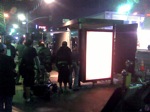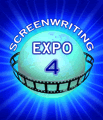 In Hollywood parlance, “additional photography” is the polite term for what used to be called reshoots. It’s a rare case where the new word is better. Most of the time, you’re not reshooting anything. You’re getting new things you didn’t know you needed the first time around.
In Hollywood parlance, “additional photography” is the polite term for what used to be called reshoots. It’s a rare case where the new word is better. Most of the time, you’re not reshooting anything. You’re getting new things you didn’t know you needed the first time around.
Woody Allen is famous for requiring additional days in his schedule (and budget) to allow for a different performance, a new scene, a funnier joke. Given how expensive a day of shooting is, that seems like a luxury, but as screenwriters it really shouldn’t. We’re accustomed to going through multiple drafts, trying things that might be Really Bad Ideas.
The chance to fuck up and fix it can be the difference between a so-so and solid.
I can speak from first-hand experience. For Go, we went back and shot several new scenes, including the resolution of the Simon-Gaines-Claire-Vics plotline. On paper, the new version wasn’t any better — in fact, it made considerably less sense. But as shot, it just worked better, condensing several scenes down to one, and wrapping up the movie faster.
For the first Charlie’s Angels, our additional photography was much more limited, basically just new establishing shots. But having seen the test scores for both the Before and After versions, I can testify to how much difference a few seconds of film can make. In most cases, it’s not that you’re adding something great, but rather that you’re replacing something sucky.
Last week, I was back in the director’s chair for additional photography on The Movie. It was only two days of shooting, but we added two new scenes, and got needed bits for three other sequences.
After seven weeks of editing, the strange thing about going back into production is that, well, it’s production. It means re-opening the production office, and hiring a crew of 45. If you’re lucky, you can hire the same crew who worked on the film the first time around. More likely, however, those people will have moved on to other productions, so you end up hiring a largely new crew. In our case, almost half of the crew who worked on these two days had no idea what The Movie was even about. That’s the remarkable thing about the below-the-line trades in Hollywood: because of how specifically the jobs are defined, they’re largely plug-and-play. The gaffer and key grip may have never met, but together they can light your scene. They don’t need to know why the scene is happening, just where the Chimera is supposed to be.
 The bulk of our art department came from Veronica Mars, which has been back in production for over a month. Since the original crew wasn’t available, I got to rock my inner design geek and handle the printed graphics myself, something I haven’t done since college.
The bulk of our art department came from Veronica Mars, which has been back in production for over a month. Since the original crew wasn’t available, I got to rock my inner design geek and handle the printed graphics myself, something I haven’t done since college.
The “accebit” poster hangs at a Metro bus stop on Wilshire Blvd. Yes, it means something, so you classics majors can get to work.
This was our first time shooting night exterior, which meant new decisions about how we wanted things to look. Personally, I’m a big fan of very black skies — think high school football movies — so we aimed for that. We also aimed at finishing before 3 a.m. We came close.
Next step? Test screening, picture lock, then sound-a-palooza.
 ](http://screenwritingexpo.com)My question is about the [Screenwriting Expo](http://screenwritingexpo.com) and other industry seminars. I realize that you are speaking this year, but is it really a worthwhile event? It seems like just another one of the money-sucks preying on desperate fledgling writers. Thanks!
](http://screenwritingexpo.com)My question is about the [Screenwriting Expo](http://screenwritingexpo.com) and other industry seminars. I realize that you are speaking this year, but is it really a worthwhile event? It seems like just another one of the money-sucks preying on desperate fledgling writers. Thanks!